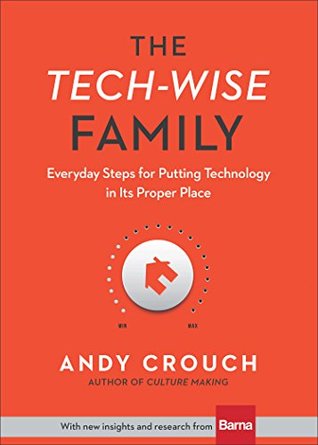More on this book
Community
Kindle Notes & Highlights
by
Andy Crouch
Read between
December 24, 2022 - January 12, 2023
it is possible to love and use all kinds of technology but still make radical choices to prevent technology from taking over our lives.
The makers of technological devices have become absolute masters at the nudge. Every notification that comes in on your smartphone is a nudge—not a command or demand, but something that makes it easier to stop whatever you’re currently doing and divert your attention to your screen.
We are continually being nudged by our devices toward a set of choices. The question is whether those choices are leading us to the life we actually want. I want a life of conversation and friendship, not distraction and entertainment; but every day, many times a day, I’m nudged in the wrong direction. One key part of the art of living faithfully with technology is setting up better nudges for ourselves.
The first family for everyone who wants wisdom and courage in the way of Jesus is the church—the community of disciples who are looking to Jesus to reshape their understanding and their character. And the church is, and can be, family for everyone in a way that biological families cannot.
So here’s where we have to start if we are going to live as flourishing families in an age of easy everywhere: we are going to have to decide, together, that nothing is more important than becoming people of wisdom and courage. We are going to have to commit to make every major decision, and many small decisions, on the basis of these questions: Will this help me become less foolish and more wise? Will this help me become less fearful and more courageous?
We will have to teach our children, from early on, that we are not here as parents to make their lives easier but to make them better.
Fill the center of your life together—the literal center, the heart of your home, the place where you spend the most time together—with the things that reward creativity, relationship, and engagement. Push technology and cheap thrills to the edges; move deeper and more lasting things to the core.
3. We are designed for a rhythm of work and rest. So one hour a day, one day a week, and one week a year, we turn off our devices and worship, feast, play, and rest together.
one of the proper places for technology is at work, where advanced tools allow us to use our skills in ways that are personally rewarding and widely beneficial.
As screens—movies, TV, video games—present a world far more colorful and energetic than the created world itself, they not only ratchet up our expectations for what is significant and entertaining; they also undermine our ability to enjoy what we could call the abundance of the ordinary.
Boredom is actually a crucial warning sign—as important in its own way as physical pain. It’s a sign that our capacity for wonder and delight, contemplation and attention, real play and fruitful work, has been dangerously depleted.
The problem isn’t with our devices themselves—it’s with the way we use them. We simply have to turn off the easy fixes and make media something we use on purpose and rarely rather than aimlessly and frequently.
In too many of our churches, however, we have settled for a technological substitute for worship: amplification, which allows a few experts to do the worshiping on our behalf while we offer far too little of our own heart, soul, mind, and strength.
The best amplification actually undergirds and calls forth great singing from the whole assembly.


